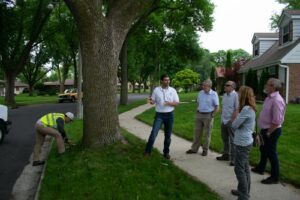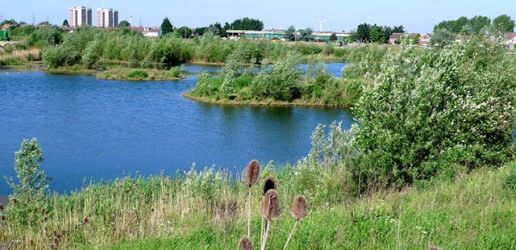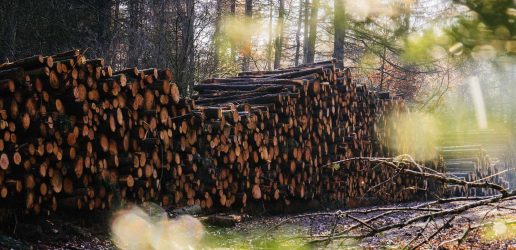Emerald ash borer (EAB, Agrilus planipennis) is a wood-boring beetle, native to SE Asia, that causes damage to ash trees (Fraxinus species). While EAB is not currently present in Europe, it has invaded and established in North America, where it is already causing extensive damage and high mortality to native ash species. To prepare for any future risk to Europe and, especially, the UK, a team from Forest Research, Fera and The Tree Council paid a visit to the US to find out more about this pest and learn from their experiences in urban management of EAB.

The group, which included Mariella Marzano and Hugh Evans from Forest Research, visited a number of cities specially chosen to include municipalities that have been dealing with EAB for varying lengths of time. Some have several years’ experience of EAB, while others are just starting EAB management or, in some cases, are yet to encounter the pest.
The aim of this fact-finding trip was to learn about the different approaches to dealing with the impacts of EAB in city neighbourhoods and parks, and how to engage communities in management efforts. A number of themes and lessons emerged.
Lessons learned
- Preparedness: All municipalities highlighted the importance of an ash tree inventory (how many and where?). Municipalities have learned lessons from the original outbreak in Michigan and research undertaken in the early years of EAB. Preparedness plans have been developed and adjusted based on the experiences of other cities, allowing municipalities to consider and implement response strategies and forewarn decision makers of management costs.
- Resources: US funding to manage EAB proactively comes from a variety of sources. The funding requests are supported by i-Tree valuations, but also knowledge about the impact of the pest in other areas. In terms of making a case for funding, municipalities preparing for EAB benefit from sending politicians and decision-makers to cities where EAB has had a high impact. However, those responsible for funding decisions require information on timescales (e.g. for how long will EAB need to be managed?) to avoid emergency budget spikes and to facilitate planning.
- Engagement and collaboration: Engagement with the local population is a high priority despite municipalities often not having particular training in this area. All areas engaged with homeowners early, frequently and in detail. Most municipalities have an outreach officer to manage the EAB problem within their community. Considerable resources and guidance on how to undertake such work are now available, but outreach and engagement is still labour-intensive. Denver city, which is still free from EAB, has invested heavily in its social media, web-based and physical campaign (including a music video and cartoon series) to raise awareness of EAB. Collaboration between service providers is also important.
- Opportunities: Municipalities have taken the opportunity to improve the species mix of street trees. Many areas had been hit hard by Dutch elm disease and subsequently replaced much of the elm with ash. Now they are keen to ensure there is greater diversity to avoid ‘putting all their eggs in one basket’ in future species choice. However, such a strategy has the potential to increase biosecurity risks as a result of a wider supply chain when experimenting with new tree species. The most cost-effective EAB management (felling trees en masse) had the side effect of creating a ‘wall of wood’ and so new mechanisms and markets needed to be created to deal with the waste wood.
- Challenges: A key challenge has been the availability of qualified staff to carry out monitoring and control work. Each municipality has a team of urban foresters, while some also rely on additional labour. As training can be expensive and time consuming, one city developed an apprenticeship scheme in order to train and, ideally, retain staff. A focus on EAB management also means that other daily tasks such as pruning have been reduced.
- Key differences with the UK: Unlike the UK, there is a defined and well-structured relationship between municipalities and homeowners with regard to street trees, providing clarity on who is responsible for maintenance of the verge from house to road. In the US, homeowners often have some responsibility for grass verges and associated trees, both for mowing and for remedial work to the trees. US municipalities also appear to have more power to enforce local ordinances and have a defined resource for urban tree management as well as multiple funding options.
Recent News
View All news
New land regeneration resources for creating green spaces on previously used land now available
The new resources bring together the latest learnings on land regeneration and climate change, and optimal soil thickness for planting on previously used land.

New national survey launched to strengthen plant pest and disease detection across UK horticulture
UK horticulture and landscaping businesses invited to take part in survey to strengthen non-native plant pest and disease detection and reporting.
Forestry and timber businesses across the UK are being asked to take part in an annual survey programme to collect data about the UK timber industry.

New land regeneration resources for creating green spaces on previously used land now available
The new resources bring together the latest learnings on land regeneration and climate change, and optimal soil thickness for planting on previously used land.

New national survey launched to strengthen plant pest and disease detection across UK horticulture
UK horticulture and landscaping businesses invited to take part in survey to strengthen non-native plant pest and disease detection and reporting.
Forestry and timber businesses across the UK are being asked to take part in an annual survey programme to collect data about the UK timber industry.

